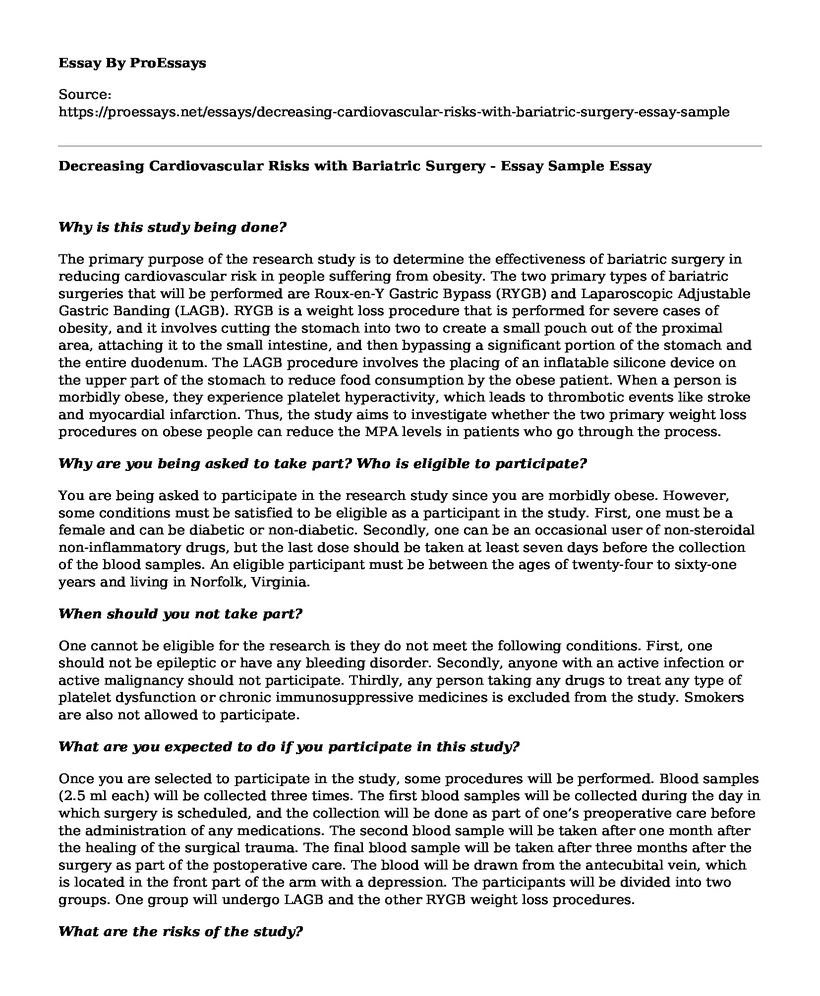Why is this study being done?
The primary purpose of the research study is to determine the effectiveness of bariatric surgery in reducing cardiovascular risk in people suffering from obesity. The two primary types of bariatric surgeries that will be performed are Roux-en-Y Gastric Bypass (RYGB) and Laparoscopic Adjustable Gastric Banding (LAGB). RYGB is a weight loss procedure that is performed for severe cases of obesity, and it involves cutting the stomach into two to create a small pouch out of the proximal area, attaching it to the small intestine, and then bypassing a significant portion of the stomach and the entire duodenum. The LAGB procedure involves the placing of an inflatable silicone device on the upper part of the stomach to reduce food consumption by the obese patient. When a person is morbidly obese, they experience platelet hyperactivity, which leads to thrombotic events like stroke and myocardial infarction. Thus, the study aims to investigate whether the two primary weight loss procedures on obese people can reduce the MPA levels in patients who go through the process.
Why are you being asked to take part? Who is eligible to participate?
You are being asked to participate in the research study since you are morbidly obese. However, some conditions must be satisfied to be eligible as a participant in the study. First, one must be a female and can be diabetic or non-diabetic. Secondly, one can be an occasional user of non-steroidal non-inflammatory drugs, but the last dose should be taken at least seven days before the collection of the blood samples. An eligible participant must be between the ages of twenty-four to sixty-one years and living in Norfolk, Virginia.
When should you not take part?
One cannot be eligible for the research is they do not meet the following conditions. First, one should not be epileptic or have any bleeding disorder. Secondly, anyone with an active infection or active malignancy should not participate. Thirdly, any person taking any drugs to treat any type of platelet dysfunction or chronic immunosuppressive medicines is excluded from the study. Smokers are also not allowed to participate.
What are you expected to do if you participate in this study?
Once you are selected to participate in the study, some procedures will be performed. Blood samples (2.5 ml each) will be collected three times. The first blood samples will be collected during the day in which surgery is scheduled, and the collection will be done as part of one’s preoperative care before the administration of any medications. The second blood sample will be taken after one month after the healing of the surgical trauma. The final blood sample will be taken after three months after the surgery as part of the postoperative care. The blood will be drawn from the antecubital vein, which is located in the front part of the arm with a depression. The participants will be divided into two groups. One group will undergo LAGB and the other RYGB weight loss procedures.
What are the risks of the study?
There are several short-term and long-term risks associated with the study. The risks associated with the surgery are lung problems, blood clots, infection, excessive bleeding, leaks in the gastrointestinal system, and in rare cases, death. The participants may experience side effects like vomiting, ulcers, gallstones, bowel obstruction, hernias, dumping syndrome, and hypoglycemia.
Are there benefits for you in taking part in the study?
There are several benefits that will be realized in the study. First, surgical procedures will lead to significant weight reduction, thus eliminating morbid mobility. Secondly, participants with type-two diabetes will recover. Thirdly, the risk of cardiovascular risk will be greatly reduced. Thrombotic events like myocardial infarction and stroke, which are the leading causes of death in obese patients, will be significantly reduced by about 82% after the bariatric surgery.
What about confidentiality?
The privacy of all the participants will be protected to maintain ethical standards and ensure integrity in the research process. The informed consent form outlines the purpose of the study and the use of the information that will be gathered from the study. Participants will be provided with the right information to help them get legal advice in case there is a breach of confidentiality in the process.
After drawing blood, it will be frozen at 4-80C up to twenty-four hours before serum separation. The whole blood will be allowed to clot first and then centrifuged for about ten minutes at 1000 times gravitational units. The specimen will be stored in a private lab that will only be accessible by the researchers. The data will be electronically stored to reduce the risk of being accessed by third parties, and only the researchers will have passwords to the computers.
Will, the participation in the study, cost you or pay you?
All the participants will be compensated for participating in the research study. Each subject will receive $200 via check after the completion of every phase. However, those who will not complete the study regardless of whether they withdraw themselves or are withdrawn by the researchers will be compensated depending on their duration of participation.
What will happen to my specimen after the end of the study?
The blood samples will be destroyed once the study is finalized. The specimen will be trashed in biohazard bins in the nearest major healthcare facility.
Cite this page
Decreasing Cardiovascular Risks with Bariatric Surgery - Essay Sample. (2023, Aug 27). Retrieved from https://proessays.net/essays/decreasing-cardiovascular-risks-with-bariatric-surgery-essay-sample
If you are the original author of this essay and no longer wish to have it published on the ProEssays website, please click below to request its removal:
- My Goals in the Field of Nursing Essay
- Reflective Essay on Nursing Meeting
- Business Negotiation/Deal Making
- Essay Sample on Role of Nurses in Medical Practises
- Essay Sample on The Evolution of Environmental Thinking in Nursing
- Essay Example on Supplements: Enhancing Exercise & Athletic Performance
- The Right Age for Drinking or Smoking Onset - Essay Sample







